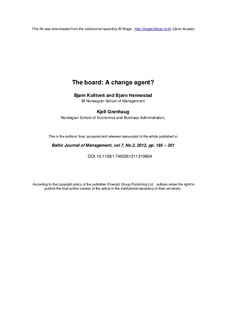The board: a change agent?
Journal article, Peer reviewed
Permanent lenke
http://hdl.handle.net/11250/93850Utgivelsesdato
2012Metadata
Vis full innførselSamlinger
- Scientific articles [2181]
Originalversjon
10.1108/17465261211219804Sammendrag
Purpose – The purpose of this paper is to provide insight into why shareholders often claim
dissatisfaction with the results delivered by their boards. A central reason is that boards fail to get
their critical decisions effectively implemented. The paper also focuses on whether boards apply
essentials developed in the change management discipline.
Design/methodology/approach – The research is based on a study of board documents to capture
what boards actually do. The documents were compiled from two Norwegian companies during the
1993-2005 period. A content analysis was the analytic tool.
Findings – The research indicates that boards apply rational and deterministic approaches to
implement critical decisions. It also reveals that boards tend to overlook essentials from the change
management discipline. The paper identifies the potential for improved board effectiveness in
implementing critical decisions.
Research limitations/implications – The main limitation of this research is that several
observations may threaten the generalizability of the findings. However, the limitations may provide
opportunities for further research.
Practical implications – Boards should motivate the chief executive officer and top management to
apply a change management perspective in implementing critical decisions. To do so, board members
must understand the critical decisions and ask appropriate questions.
Originality/value – The main value of this paper pertains to the contribution regarding why
shareholders claim dissatisfaction with board-delivered results.
Beskrivelse
This is the authors’ final, accepted and refereed manuscript to the article published in
Baltic Journal of Management
